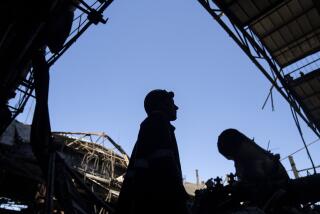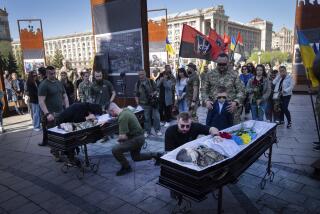Russians Fear a Nuclear Emergency : Energy: Accident at plant near St. Petersburg reveals disorganization, official charges.
- Share via
MOSCOW — One day after radioactive steam spurted from a nuclear reactor, officials in St. Petersburg said Wednesday that there was no danger to people or the environment, but some said the accident revealed how vulnerable their city would be in a true emergency.
“It is good that the danger has passed us, but if the accident had been more serious, the city would have demonstrated its total inability to cope,” the chairman of St. Petersburg City Council’s ecology committee, Igor Y. Artemiev, told a press conference.
Tuesday’s events showed that authorities in Russia’s second-largest city--which with its suburbs is home to 5 million people--are so disorganized that they would be incapable of carrying out an evacuation or decontaminating irradiated areas, despite having adequate resources, Artemiev charged.
Evidently reacting to the accident at St. Petersburg’s nuclear power plant, Sergei Shoigu, chairman of the Russian State Committee on Civil Defense and Emergencies, decreed a restructuring of the civil defense system, including creation of an academy to train highly skilled personnel, Russia’s Itar-Tass news agency said.
Speaking to reporters in Moscow, Shoigu said that all nuclear plants and research centers, of which there are 400 in Russia, must be regarded as potential dangers, and he expressed concern over the chronic shortage of spare parts and the exodus of specialists from the nuclear industry to other sectors.
“For the last two or three months, we have done a lot to raise nuclear power workers’ wages,” he said.
With the disappearance of the Soviet Union and its centralized government, Western countries are worried about the ability of individual republics, such as Lithuania or Ukraine, to maintain world-level safety standards. Tuesday’s accident will only add to pressures at home and abroad for the shutdown of so-called RBMK-type reactors, the same type of unit that exploded and caught fire in 1986 at Chernobyl, causing the world’s worst nuclear power accident.
Early Tuesday, an RBMK reactor at the nuclear power station 40 miles west of St. Petersburg blew a leak, releasing radioactive gases and iodine that were carried by the plant’s ventilation system to the air outside.
The amount of radioactive matter released was only a fraction of the deadly fallout unleashed at Chernobyl. The state committee in charge of nuclear power plant safety said Wednesday that the situation at the station on the Gulf of Finland “has fully normalized,” with radiation back to customary levels.
St. Petersburg authorities said the reactor will remain idle until it is inspected by a team sent by the Vienna-based International Atomic Energy Agency.
New uncertainty was cast on the situation, however, with a report from the Associated Press that a Finnish official said tiny particles of radioactive iodine had been found Wednesday in air samples taken since March 19, five days before the accident was reported.
Hannu Koponen, deputy director of the Finnish Center for Radiation and Nuclear Safety, said in Helsinki that the find raised the possibility that the reactor leak occurred on that earlier date. He said the iodine was discovered in routine air samples gathered from March 19 through Monday in Imatra, 43 miles west of St. Petersburg.
“It’s an indication that a leak could have taken place at the plant before the accident reported on Tuesday,” he said.
Elsewhere on the energy front, Russian government officials and lawmakers clashed over the government’s plan to lift state-imposed ceilings on the price of petroleum products. Oil was so cheap under the Soviet government pricing system that crude bought at the wellhead was worth less than mineral water.
Russia had been due to free energy prices and let them seek their market levels in mid-April. But President Boris N. Yeltsin’s government, pressured by other ex-Soviet republics, has agreed to postpone the measure until after the spring sowing season.
Information Minister Mikhail N. Poltoranin said that oil prices should now be freed in June. But the Speaker of the Russian Parliament, Ruslan I. Khasbulatov, who opposes many of the government’s policies as ruinous for industry and consumers, said a “full liberalization” of energy prices should be voted down by the legislature, setting the stage for a political battle.
More to Read
Sign up for Essential California
The most important California stories and recommendations in your inbox every morning.
You may occasionally receive promotional content from the Los Angeles Times.













